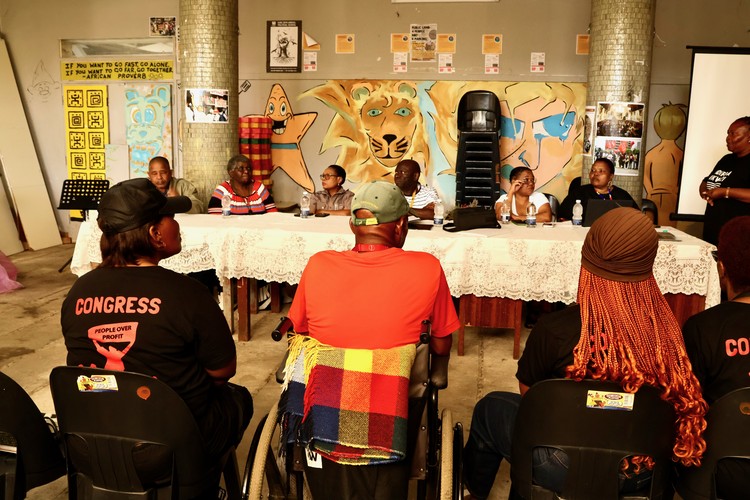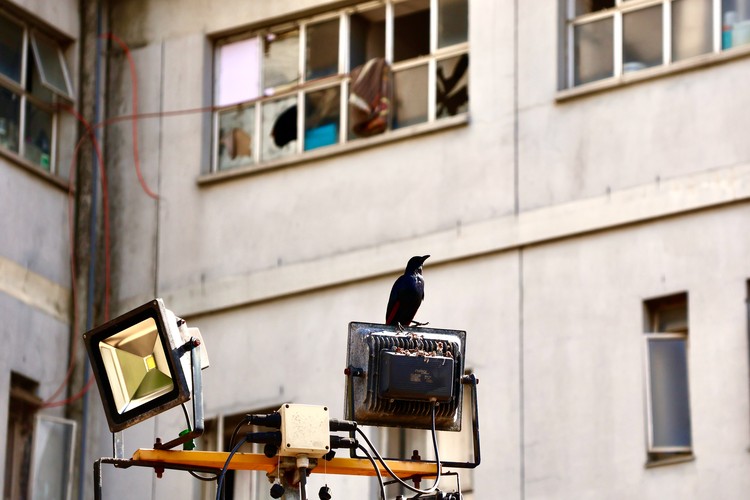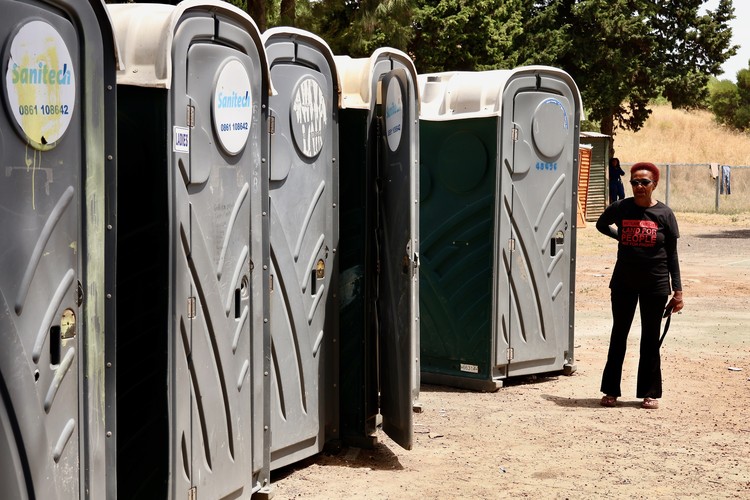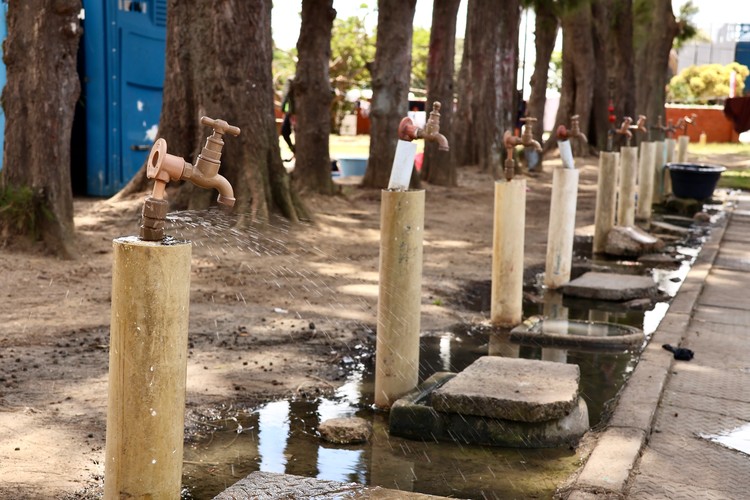MPs condemn unsafe living conditions at occupied Cape Town building
Helen Bowden Nurses Home, near the V&A Waterfront, was occupied in 2017
The Helen Bowden Nurses Home, renamed Ahmed Kathrada House by housing activists, is home to about 800 people. It is a stone’s throw from the V&A Waterfront. Photos: Matthew Hirsch
Members of Parliament conducted an oversight visit to Helen Bowden Nurses Home on Friday, which was unlawfully occupied in 2017 as part of a campaign for affordable housing near Cape Town’s inner city. The building had been vacant for several years.
Residents of the home, renamed Ahmed Kathrada House by activists, told MPs that although they face unsafe living conditions and don’t have electricity, they want to stay there because it is located close to job opportunities.
The visit by members of Parliament’s Portfolio Committee on Human Settlements was in response to requests by housing movement Reclaim the City. Some of the MPs had also attended a conference hosted by housing advocacy group Ndifuna Ukwazi earlier this year, further prompting them to visit the site.
The property is owned by the Western Cape Government, which plans to build a mixed-use development which will include affordable housing. But the government says the current residents would first have to be evicted and the building demolished.
Members of Parliament’s Portfolio Committee on Human Settlements meet with residents.
Nozi Sigwela, a researcher at Ndifuna Ukwazi, said there were more than 430 households and about 800 people living in the building. She added that most residents were single mothers, children and elderly people.
Resident Thandi Tyalana said she has found work opportunities because the property is in a well-located area. “I hit rock bottom. I found refuge here,” she said. “We are not criminals. Go and tell them that you’ve met great people here; these people work. We just find ourselves in unfortunate situations.”
One of the rooms at Helen Bowden Nurses Home.
Reclaim the City leader Megan Bobotyana said, “We are also taxpayers. We also contribute to the economy of South Africa, and therefore, we should be treated as such. We’ve never said that we want this building for free.”
Bobotyana said the property can be developed without demolishing the building and displacing the current residents. Architects and town planners have been engaged on this, she said. “We’ve got documents to prove that we’ve done our research. This can be done on this site.”
“People are clear that they don’t want to leave here. We want to live here. We want this place developed. That’s all we want,” she added.
But residents also spoke about how they often feel unsafe because there is no electricity, especially when they have to go outside at night to use mobile toilets and communal taps.
They also spoke about how SAPS were slow to respond to incidents at the building.
Solar-powered flood lights are used to light up the quad at night. Electricity was cut off soon after the occupation in 2017.
Committee chair Nocks Seabi (ANC) told residents that they were there to learn, and wanted further engagements with parties involved.
Walking through the occupation, MPs were shown people’s rooms, vegetable gardens and even a spaza shop. They also went outside to see the mobile toilets and communal taps shared by the 800 residents.
There are only ten toilets shared by the building’s 800 occupants.
Speaking to GroundUp after the site visit, Seabi said: “We thought it was important to come and see for ourselves … What we found is that people are living in horrible conditions. They are using communal taps and (mobile) toilets. It is not a healthy situation.”
He said he will request the national Minister of Human Settlements to arrange a meeting with the City of Cape Town and the Western Cape Government.
“The committee has long advocated for spatial redress, especially in the context of the cost of proximity to economic, work opportunities and spatial transformation. Despite this, the committee doesn’t encourage illegality, but constructive interaction to find resolutions to shortcomings,” Seabi said in a statement.
The communal taps break easily, residents told MPs.
Support independent journalism
Donate using Payfast

Don't miss out on the latest news
We respect your privacy, and promise we won't spam you.
Next: Inner city Cape Town: no room for locals
Previous: We’re taking government to court for failing to provide clean water
Letters
Dear Editor
Unhealthy and unsafe living conditions at the occupied Ahmed Kathrada House again exposes the deep spatial injustice at the heart of your city. Residents live without basic services, yet are a stone’s throw from these basic and essential services at the V&A Waterfront.
This is not simply a problem of one building. It is a test of whether Cape Town’s Integrated Development Plan (IDP) and Municipal Spatial Development Framework (MSDF) will genuinely confront apartheid spatial planning injustice or entrench it.
The Constitution obliges all spheres of government to take reasonable measures, within available resources, to realise the right of access to adequate housing and to protect people from arbitrary eviction (s 26). Those obligations cannot be met while well-located public land and buildings remain underused or are treated primarily as assets for private, high-end development.
I therefore call on the Executive Mayor to:
• Explicitly prioritise inclusive housing and well-located social housing in the IDP and MSDF, with measurable targets for inner-city and Sea Point/Green Point precincts, including the Somerset Hospital/Helen Bowden site.
• Use planning and zoning powers, incentives and conditional approvals to reverse, not reproduce, apartheid geographies, in line with the principles of spatial justice and the right to the city.
• Work with the Province, Reclaim the City, Ndifuna Ukwazi and residents to develop a lawful, humane plan that upgrades living conditions at Ahmed Kathrada House and secures long-term, affordable tenure options close to jobs, schools, health care and public transport.
Cape Town often presents itself as a world-class, “inclusive” city. That claim will ring hollow for as long as low-income families must choose between unsafe occupation in the inner city, or formal housing on the distant urban edge.
© 2025 GroundUp. This article is licensed under a Creative Commons Attribution-NoDerivatives 4.0 International License.
You may republish this article, so long as you credit the authors and GroundUp, and do not change the text. Please include a link back to the original article.
We put an invisible pixel in the article so that we can count traffic to republishers. All analytics tools are solely on our servers. We do not give our logs to any third party. Logs are deleted after two weeks. We do not use any IP address identifying information except to count regional traffic. We are solely interested in counting hits, not tracking users. If you republish, please do not delete the invisible pixel.






